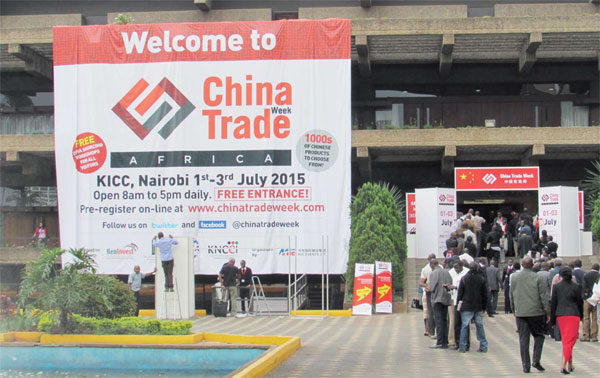Kenyan entrepreneurs flock to link up with Chinese traders
Nairobi hosts inaugural fair aimed at aiding businesses to forge partnerships
What was billed as the first China Trade Week of its kind in East Africa, which ran for three days from July 1 to 3 in the Kenyan capital of Nairobi, attracted more than 10,000 visitors, organizers say.
The event, which opened at Kenyatta International Convention Center's Tsavo Ballroom on July 1, featured more than 150 Chinese companies all hoping to find African partners.
|
The first China Trade Week of its kind in East Africa was held at the Kenyatta International Convention Center in Nairobi, attracting 150 Chinese companies as exhibitors. Photos provided to China Daily |
The companies covered various sectors, including construction, consumer electronics, electric vehicles, plastic molding equipment and materials, home electrical goods, new energy devices, and elevators systems.
"We ran out of name tags, catalogues and bags for visitors," says David Wang, managing director of MIE Group, which organized the event. "We'd planned for 3,000 for the first day, but we were overwhelmed by the number of visitors who showed up."
MIE Group is a Chinese company based in Dubai that has previously helped many Chinese exhibitors to attend the Big 5 Show, the largest construction industry trade fair in the Middle East.
China Trade Week was organized in partnership with the Kenya Investment Authority, the Kenya National Chamber of Commerce and Industry and the Kenya Private Sector Alliance.
On the opening day, Pius Rotich, general manager of investment and promotion for the Kenya Investment Authority, welcomed the Chinese traders and encouraged them to forge partnerships with their Kenyan counterparts. The fair would play a vital role in creating investment opportunities for locals as well as small and medium-sized enterprises, he says.
James Nyongesa, a businessman and leader of the Busia town business community, says he traveled more than 450 kilometers to attend the event.
"I was asked to attend the trade fair and look for potential Chinese partners ahead of my trip to China in September," he says, adding that his company, Light House Ltd, which is based near Kenya's border with Uganda, already uses Chinese materials.
Alice He, who was representing Guangdong Yabo Furniture Industries Co Ltd, says her company was attracted to the fair because Kenya's hospitality industry is growing rapidly, with major hotel chains such as Marriott now building properties in Nairobi.
Based in Foshan city's Shazui Industrial Park in Guangdong province, the company specializes in designing and making furniture for high-end hotels, with previous clients including Marriott hotels in the United States, the Park Plaza Westminster Bridge Hotel in Britain, Station Hotel Maiwshi in Japan, and the Kazakhstan Casino. In Africa, Yabo Furniture has worked with the Premier Le Reve Hotel and Spa in Egypt, the Africa Angola Ritz Hotel, the South Star International Hotel in Ethiopia, and the Zinc City Hotel in Rwanda.
Wang says MIE Group, of which the Chinese government owns 20 percent, is considering opening an office in Nairobi to ensure the trade fair becomes an annual event.
As to why the Kenyan capital was chosen as the venue for the inaugural fair, Gary Robinson, MIE Group's events director, explains: "Kenya is strategically placed on the continent. It has a vibrant economy. It has a high population, a growing middle class, and several on-going infrastructure projects being undertaken by Chinese contractors such as the Standard Gauge Railway. Kenya is also home to a growing number of SMEs."
He adds that the company's next trade fair will be held in Abu Dhabi, the United Arab Emirates.
The trade fair in Nairobi comes at a time of increased trade activities between China and Kenya, which continues to influence bilateral relations.
In the past decade, China has become Kenya's largest source of foreign direct investment and second-largest trade partner. According to the World Investment Report 2014 published by the United Nations Conference on Trade and Development, in 2013, China's cumulative direct investment in the African country reached $474 million. In that same year, bilateral trade was worth $8.4 billion.
Wang says the friendship between the two countries has been growing stronger every day and that 15 percent of all imports to Kenya now come from China.
He also tells China Daily that MIE is "fully committed to realizing the Belt and Road Initiative, so as at to re-establish the ancient Silk Road and maritime routes."
The initiative, first proposed by Chinese President Xi Jinping in 2013, aims to establish new routes linking Asia, Europe, Africa and the countries in between.
The initiative has two parts: The Silk Road Economic Belt, which will link China and Europe, and the 21st Century Maritime Silk Road, which will link ports in China with the African coast and other areas.
The Chinese port city of Quanzhou, which is close to Jiuri Mountain in Fujian province, is the birthplace of the ancient maritime road.
At the foot of the mountain is an engraving that reads: "The ancient maritime route is special not only to Chinese, but also to East Africans because after starting at Jiuri Mountain it ends on the coast of Somalia and Kenya."
For China Daily

























